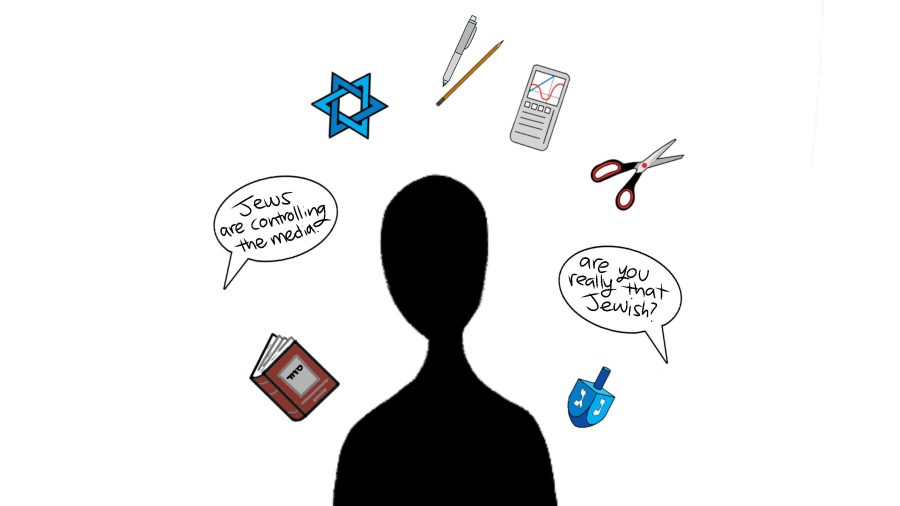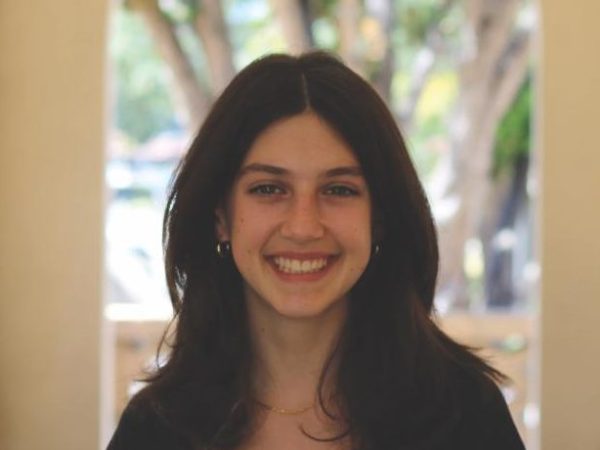Gunn sophomore Annabel Honigstein often enjoyed her lunch at Piazza’s with friends from both Jane Lathrop Stanford Middle School and her previous school, Gideon Hausner Jewish Day School. During one of these lunches, Honigstein’s JLS friends asked if she was Jewish. When she said she was, she said they started making comments like, ‘Your dad’s a banker, and your friend’s dad is a banker too.”
Like Honigstein, many PAUSD Jewish students say they have experienced instances of discrimination and feel like they are not included in the district’s curriculum as much as they should be.
Honigstein said Jews are not represented in an inspiring way in her classes, especially to non-Jews.
“(If I were) a non-Jewish kid, I really wouldn’t know anything about Jewish people other than the fact that so many died in the Holocaust, which is just an unfortunate way of looking at things,” Honigstein said.
Honigstein said much of the way Jews are portrayed in the PAUSD curriculum perpetuates Jew victimization — where Jews throughout history are seen as always being victims.
Chemistry teacher Michael Mishali, who is an Atheist but was raised as a conservative Orthodox Jew, said he still carries on Jewish traditions from his childhood and wishes that the history of the Jewish people wasn’t so limited in school.
“(History class) really does paint a very small picture about people,” Mishali said. “But we’ve been around for a very long time, and Jewish people have done more than be scapegoats.”
Honigstein thinks this limited view of Jews in the school curriculum could be helped by bringing more attention to Jewish politicians, powerful historical figures or celebrities in the classroom.
“There are just so many Jewish leaders out there that have made such big contributions to society, but they’re never really shouted out,” Honigstein said. “It would be really cool to see more Jewish representation (in our) curriculum.”
Some Jewish students and teachers said microagressions and subtle anti-Semitism is a problem that they experience at PAUSD as well.
Honigstein said she remembers learning about the Holocaust and having her teacher single her out in front of the class to ask whether the teacher was pronouncing the name of a concentration camp correctly. Honigstein also said she has experienced microaggressions related to stereotypes about Jewish people.
“I’ve heard the, ‘Oh, you’re Jewish. That’s why your nose looks like that,” Honigstein said. “Or ‘Your dad’s a banker.’”
Part of the problem, Honigstein said, is that most people are not aware that these offhanded comments are offensive.
“I would say there’s been quite a few microaggressions that I don’t think people do intentionally. I think it’s in a friendly, joking way. But nonetheless, it’s not OK.”
Paly senior Simon Illouz said just like other Jewish students in PAUSD, the microaggressions and anti-Semitism he experienecs are mostly unintentional jokes.
“Personally, I hear coin jokes or gas jokes (or things like) ‘Jews are controlling the media,’” Illouz said.
Paly senior Sofia Antebi, a Vietnamese and Latina Jew, described how many people react to her being Jewish.
“I’ve had some people tell me, ‘oh, are you really that Jewish,’ or kind of invalidate that part of my identity,” Antebi said.
Mishali said he likes talking about his Jewish identity when he knows it will be well received, which isn’t always the case. He said he doesn’t openly share with his students that his dad is Israeli.
“I worry that people will see me and see politics behind that,” Mishali said. “You know, they’ll see me and think a certain thing of me.”
While Mishali is cautious around students and others when sharing about his Jewish traditions, Antebi said she likes seeing teachers make an effort to include the Jewish experience in their classroom, especially around the holiday season.
“I think it’s really cool to see sometimes teachers put up a menorah, (to) have that kind of inclusion,” Antebi said.
Honigstein said PAUSD should collaborate with the Jewish Student Union and inform Jewish and non-Jewish students about Jewish holidays and the effects of anti-Semitism.
“(PAUSD) does this occasionally for other holidays,” Honigstein said. “I think it would be really inclusive if they did it for us as well, even if it’s a small Schoology post.”
Honigstein is also part of an international Jewish teen movement, and she wants those around her to learn more about the effects of anti-Semitism.
“Anti-Semitism is so often left out of people’s activism, and everyone who stays silent about it is to blame, whether they overhear a microaggresion and don’t say anything, or they choose to ignore learning about anti-Semitism,” Honigstein said.
Honigstein said Jews should stand up for themselves to help people understand why their words are discriminatory.
“I make sure to never stay silent when I overhear microaggressions or if one is directed at me,” Honigstein said. “Because no one will ever learn if we don’t help them understand why what they said is in fact a microaggression.”


